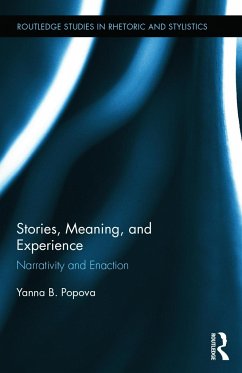This is a book about the human propensity to think about and experience the world through stories. 'Why do we have stories?', 'How do stories create meaning for us?', and 'How is storytelling distinct from other forms of meaning-making?' are some of the questions that this book seeks to answer. Although these and other related problems have preoccupied linguists, philosophers, sociologists, narratologists, and cognitive scientists for centuries, in Stories, Meaning, and Experience, Yanna Popova takes an original interdisciplinary approach, situating the study of stories within an enactive understanding of human cognition. Enactive approaches to consciousness and cognition foreground the role of interaction in explanations of social understanding, which includes the human practices of telling and reading stories. Such an understanding of narrative makes a decisive break with both text-centred approaches that have dominated structuralist and early cognitivist views of narrative meaning, as well as pragmatic ones that view narrative understanding as a form of linguistic implicature. The intersubjective experience that each narrative both affords and necessitates, the author argues, serves to highlight the active, yet cooperative and communal, nature of human sociality, expressed in the numerous forms of human interaction, of which storytelling is one.
Hinweis: Dieser Artikel kann nur an eine deutsche Lieferadresse ausgeliefert werden.
Hinweis: Dieser Artikel kann nur an eine deutsche Lieferadresse ausgeliefert werden.








